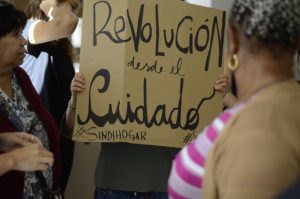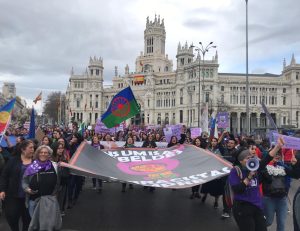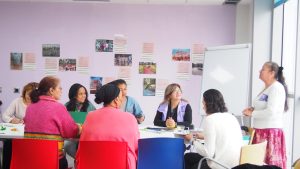At the end of 2019, we started to seriously think about power relations existing in our work, both in our relationship with our grantees and inside the team. Some criticisms of migrant and racialized women we were supporting at the time opened our eyes. We decided antiracism should not be left as a matter of individual choice for our staff. So, we initiated a process to integrate a decolonial perspective into how we work.

Photo credit: Calala Women’s Fund
In 2020 the whole team participated in training on decolonial perspectives and antiracist feminisms, and we carried out a diagnosis to analyse five areas within Calala from a decolonial perspective: Political will, Organizational Composition and Structure, Technical Competencies, Organizational Culture, and Monitoring. Considering the results, in 2021 we have developed a Work Plan with the next steps to integrate this perspective into our organization.
These actions will help us to incorporate a decolonial perspective into our formal policies, to move towards a more horizontal structure, to strengthen our individual and organizational skills to sustain decolonial action, to make this perspective a shared responsibility that is central to our spirit and to have ways to see if we are on the right path.
We know more and more actors in the philanthropy sector are developing their own processes or assessing if they want to undertake similar steps. This is why, as part of the team, we would like to share with you what we have learned until now.
Philanthropy is still a white space. This is why we are committed to opening this space for our grantees, so people with lived experience can participate and bring their own voices and perspectives.
To carry out a process of this kind is a big decision for any funder. We need to bear in mind the ethics of flexibility to be open to change. The ethics of reparation, understanding the place we occupy in power relations. And the ethics of courage, daring to break patterns. We need to reflect all the time on how injustice works globally, accepting history from a place of humility and assuming the privileges we have.

Photo credit: Calala Women’s Fund
The decolonial perspective has taught us that knowledge is shared and is created in community. Great ideas are always collective and come from the art of listening. In our learning process, establishing a horizontal and trusting dialogue with our grantees, led by women with lived experiences, has been key. We are sure that a sincere conversation has been possible thanks to the existing diversity in our own team.
When our team started to grow, we took the conscious decision of building an organization with people from different origins, life experiences and sexual orientations. This plurality provides us with critical points of view, different ways of doing, different rhythms. The result is beautiful creativity in what we do. We believe this policy is something very innovative in the Spanish philanthropic sector.
Philanthropy is still a white space. This is why we are committed to opening this space for our grantees, so people with lived experience can participate and bring their own voices and perspectives. We find this is disruptive, groundbreaking and very pedagogical for the philanthropic sector itself.
When designing and managing our grantmaking portfolios, we are trying to escape the corsets of a thematic approach. From the hegemonic vision, we organize or work by themes. We are now breaking this by looking into what is hegemonic and what is not. Often this is hard because to let other worlds emerge, we need to stop supporting other causes.

Photo credit: Calala Women’s Fund
Something we value in our decolonial journey is that we are giving space to things that go beyond rational thinking, such as the emotional and the spiritual dimensions. The hegemonic culture has taught us to live only in our minds. The decolonial perspective is showing us that not everything is rational, especially when working with women from oppressed groups. Their wounds are rational, but also emotional. They live with wounds in the way they interpret the world, in their lineage, in their people and in their everyday experiences. And for many spirituality is a path to healing.
This is also linked to the relationship we are trying to build with our grantees. When we approach them, we listen to them and let space for them to share beyond the work they are carrying out with our support. They talk to us about their emotions, their spiritualities and their worldviews. By doing so, we break our western perception of time, centring care, active listening or creativity.
We know we still have a long way to go and that this process is not free of challenges. But we are deeply committed to continuing questioning the way we see the world, our own beliefs, and how we act and work. We also know that we are a small grain of sand in the philanthropic sector and that we need many more onboard. We are convinced that, for philanthropy to contribute to building a just world, we all need to walk this path together.
Marga Morales and Fiona Montagud both work at the Calala Women’s Fund. They jointly authored this article from their perspectives as a racialized migrant woman from El Salvador living in Spain and a Spanish white woman.







Comments (2)
This perspective will help to overcome defined roles and to bring diversity to the next level!